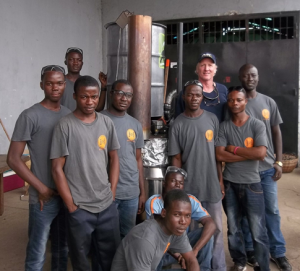
BWI’s Renewable Energy Center in Kakata, Liberia is doing daily runs of three PP20’s to supply a large portion of their campus with power. Planning to begin a commercial mini grid project, BWI REC hopes to begin selling power at affordable rates to a even larger service area adjacent to the campus, and hopes to become self sustaining. Too remote to be included in the unreliable national power grid, BWI has had to use expensive diesel power in their attempt to reboot their institution after its devastation during the recent civil wars.
 But Liberia is coming back. Kakata was at the center of the extensive rubber farms that were planted by US companies in the 1920’s to circumvent the European colonial control of rubber production. Today, it is surrounded by more than one hundred thousand acres of rubber plantations, most of whose trees no longer produce. These trees, which need to be replaced if the rubber operations are to be restarted, represent an enormous supply of biomass. This combination of energy instability and the plentiful nearby biomass resource that surrounds the campus is the principal reason why APL has partnered with BWI and made a commitment to doing whatever is needed to ensure their power system is a successful enterprise.
But Liberia is coming back. Kakata was at the center of the extensive rubber farms that were planted by US companies in the 1920’s to circumvent the European colonial control of rubber production. Today, it is surrounded by more than one hundred thousand acres of rubber plantations, most of whose trees no longer produce. These trees, which need to be replaced if the rubber operations are to be restarted, represent an enormous supply of biomass. This combination of energy instability and the plentiful nearby biomass resource that surrounds the campus is the principal reason why APL has partnered with BWI and made a commitment to doing whatever is needed to ensure their power system is a successful enterprise.
 The recent Ebola outbreak was a difficult set back, but APL continued to support the project and worked closely with its staff to help them weather the crisis. That work has paid off and the powerplant and the college are back online. All the activities you see here–sewing, cutting wood, welding, using a computer, even making cold drinks–are being powered by Power Pallets running every day, using rubber tree chips for fuel. It’s great to see the energy being put to such a productive and educational use, and nice also to know that they no longer have to rely on diesel for power.
The recent Ebola outbreak was a difficult set back, but APL continued to support the project and worked closely with its staff to help them weather the crisis. That work has paid off and the powerplant and the college are back online. All the activities you see here–sewing, cutting wood, welding, using a computer, even making cold drinks–are being powered by Power Pallets running every day, using rubber tree chips for fuel. It’s great to see the energy being put to such a productive and educational use, and nice also to know that they no longer have to rely on diesel for power.
